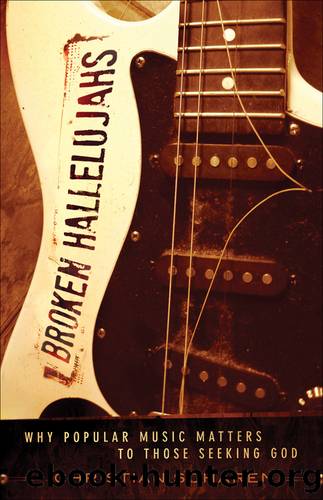Broken Hallelujahs by Christian Scharen

Author:Christian Scharen
Language: eng
Format: epub
Tags: REL062000, REL012000, REL067000, Christianity and culture, Popular culture—Religious aspects—Christianity, Popular music—Religious aspects—Christianity
Publisher: Baker Publishing Group
Shining a Light
Focus developed a series of age-graded print magazines for children and teens throughout the 1990s. A key feature of this effort was the print magazine and now website on entertainment: Plugged In. Through its popular reviews of mediaâmovies, music, television, videos, and gamesâPlugged In has grown dramatically in reach, especially since Jim Daly took over as president of Focus in 2005. With the goal of expanding the Focus audience to younger and broader evangelical and nonevangelical Christian demographics, Daly moved to Focusâs first-ever network television ads and worked to use new avenues for distributing content. Plugged In Online gets roughly a million visitors monthly and creates weekly podcasts, one- or two-minute radio and television movie review shorts, and distributes an e-newsletter. These and other aggressive efforts show that Daly was positioning Focus to transition not only through Dobsonâs retirement (in 2009) but also into the new century, in which the thirty-minute radio showâif not dead yetâwas becoming only one part of a sophisticated multimedia effort at Focus.
While Dobson has not served as a regular author of Plugged In content, his perspective sets the tone here, as it has throughout Focus as an organization. This is not surprising to insiders. Despite his folksy style on his radio show, Dobson is known inside Focus as âcontrolling,â with a tendency toward âmicromanagement.â[173] One can see Dobsonâs views on popular entertainment scattered throughout his books and many columns written in response to questions from constituents. Take, for instance, a column Dobson wrote in response to a listener who asked, âI remember adults complaining about the music of my day. Doesnât every generation of parents think their kids have gone too far?â Dobson took this question as an opportunity to review the popular rap album Nasty as They Wanna Be by the Florida group 2 Live Crew. The album is by all accounts nasty, and Dobson points out that it was banned as âobsceneâ by a Florida judge.[174]
More revealing, however, is the method Dobson follows in making his case for the problematic nature of this âmusicâ (Dobson puts the term in quotation marks to accentuate his scorn). âAt the risk of upsetting our readers,â Dobson begins, âlet me list for youâas discreetly as possibleâthe words that appear in the album Nasty as They Wanna Be. He begins with â226 uses of the f-wordâ and continues in systematic fashion, detailing all words that could be considered sex-related down to âone reference to incest.â Noting that the album sold more than two million copies, Dobson warns that âyoungstersâsome only 8 to 10 years of ageâbuying this âmusicâ typically listened to it dozens, or perhaps hundreds, of times.â While he roundly criticizes those liberal media figures who defended 2 Live Crew on either artistic or free speech grounds for failing to address the actual content of the lyrics, Dobson does not actually quote the lyrics either, nor does he speak with any youth who are fans. He moves from worries about youth listening to this album
Download
This site does not store any files on its server. We only index and link to content provided by other sites. Please contact the content providers to delete copyright contents if any and email us, we'll remove relevant links or contents immediately.
Getting It, Then Getting Along by L. Reynolds Andiric(650)
Religion and Politics Beyond the Culture Wars : New Directions in a Divided America by Darren Dochuk(553)
Global Justice, Christology and Christian Ethics by Lisa Sowle Cahill(420)
Positive Psychology in Christian Perspective: Foundations, Concepts, and Applications by Charles Hackney(350)
Forgiveness and Christian Ethics by Unknown(341)
Douglas Hamp The First Six Days by Unknown(291)
The Horrors and Absurdities of Religion by Arthur Schopenhauer(268)
Insurgency, Counter-insurgency and Policing in Centre-West Mexico, 1926-1929 by Mark Lawrence(253)
Christian Martyrdom and Christian Violence by Matthew D. Lundberg;(240)
Middle Eastern Minorities: The Impact of the Arab Spring by Ibrahim Zabad(237)
Beyond Heaven and Earth by Gabriel Levy(230)
God and Eros by Patterson Colin;Sweeney Conor;(229)
The Oxford Handbook of Greek and Roman Mythography by R. Scott Smith;Stephen M. Trzaskoma;(228)
The Bloomsbury Reader in Christian-Muslim Relations, 600-1500 by David Thomas;(218)
Autobiography, Volume 2: 1937-1960, Exile's Odyssey by Mircea Eliade(214)
Cult Trip by Anke Richter(208)
Witches: the history of a persecution by Nigel Cawthorne(201)
An Introduction to Kierkegaard by Peter Vardy(197)
The Myth of Disenchantment by Jason A. Josephson-Storm(187)
